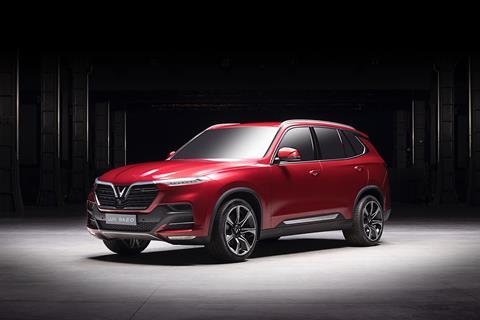Which automaker partnered with Boeing for a personal luxury aircraft?
What brand priced its Tesla Model 3 rival for Europe?
This is our look back at the Week In Reverse—right here at Green Car Reports—for the week ending October 11, 2019.
One of the much-discussed pieces of news of the week came from the UK, and a well-funded long-shot project aiming to make an high-efficiency electric car. Dyson said that its electric-car program is done—although it will continue work on some of the ancillary tech, including solid-state batteries.
Patent drawing for Dyson electric car due in 2021
Several important pieces of news came from Toyota. It revealed that the next-generation version of its Mirai hydrogen fuel-cell car is a sport sedan. Although the radical remake is officially called a concept car, the future is suddenly looking much better for that model, as well as the Prius. Toyota also confirmed that a 2021 RAV4 plug-in hybrid is on the way—although it will be some time before we get range and mpg. And its luxury brand, Lexus, teased the design of a production-bound electric city car, set to bow at the Tokyo show.
A new Honda Fit hybrid has been confirmed for a Tokyo show debut and is a critical model for Europe—although chances are slim that the model will arrive in the U.S.
Porsche Boeing premium urban air mobility vehicle
Porsche and Boeing are involved in a premium personal aircraft project—not a shared air taxi, but something aiming for private ownership.
Volkswagen is hoping its owners see the light—with a new light-based communications feature in its ID 3 urban electric car. We would presume it’s also headed to the other ID models that are U.S.-bound.
Volvo announced that it’s merging engine development into a new joint venture with parent Geely—so it can focus efforts on EV development. And as we eagerly await the introduction of the Volvo brand’s first fully electric model next week, pricing was detailed for the related Polestar 2—including its Performance Pack version—in several of its European launch markets.
Polestar 2
In the issues and policy department, U.S. commute times reached a new high in 2018, a cloud that hangs over us even as vehicles continue to get cleaner and more efficient. And Denmark and the UK were among the nations looking to tighten the timeline for phasing out internal combustion engines.
India is very much seen as an emerging (and important) market for EVs, with some challenges. Tata will be targeting its own domestic market with a vehicle called the Tata Nexon EV. This model could be seen as a serious rival to models coming from both European automakers, Japan, and China.
Volta free DC fast charging
The charging-network news keeps flowing, as infrastructure takes form in Europe and North America. Volta readied its ad-supported free DC fast charging network in the U.S. and announced its first station starting later this month. The energy company Repsol claimed the highest power passenger-vehicle DC fast-charging station in Europe. And Electrify Canada announced that it’s pushing ahead this year with more than 20 fast-charging stations—enabled for a future-leaning 350 kw—at Canadian Tire locations across the country.
We learned that Tesla has quietly acquired the Canadian battery maker Hibar. Could it mean the automaker is setting up to make its own proprietary cells?
At the start of the week we rounded up a list of the most important electric cars for 2020.
2020 Audi Q5 plug-in hybrid (Euro-spec) – first drive, October 2019
Back on Monday and Tuesday, we also brought you two sets of first drive impressions on Audi’s upcoming plug-in hybrid vehicles—in the Q5 crossover and the A8 flagship sedan—to see how they fit into a lineup that’s rapidly going electric.
And as you head out this weekend to go watch the game, you might remember some news we reported at the start of the week: that Anheuser-Busch and Frito-Lay are expanding plans—in California—to deliver their beer and snacks with electric trucks.
_______________________________________
Follow Green Car Reports on Facebook and Twitter

